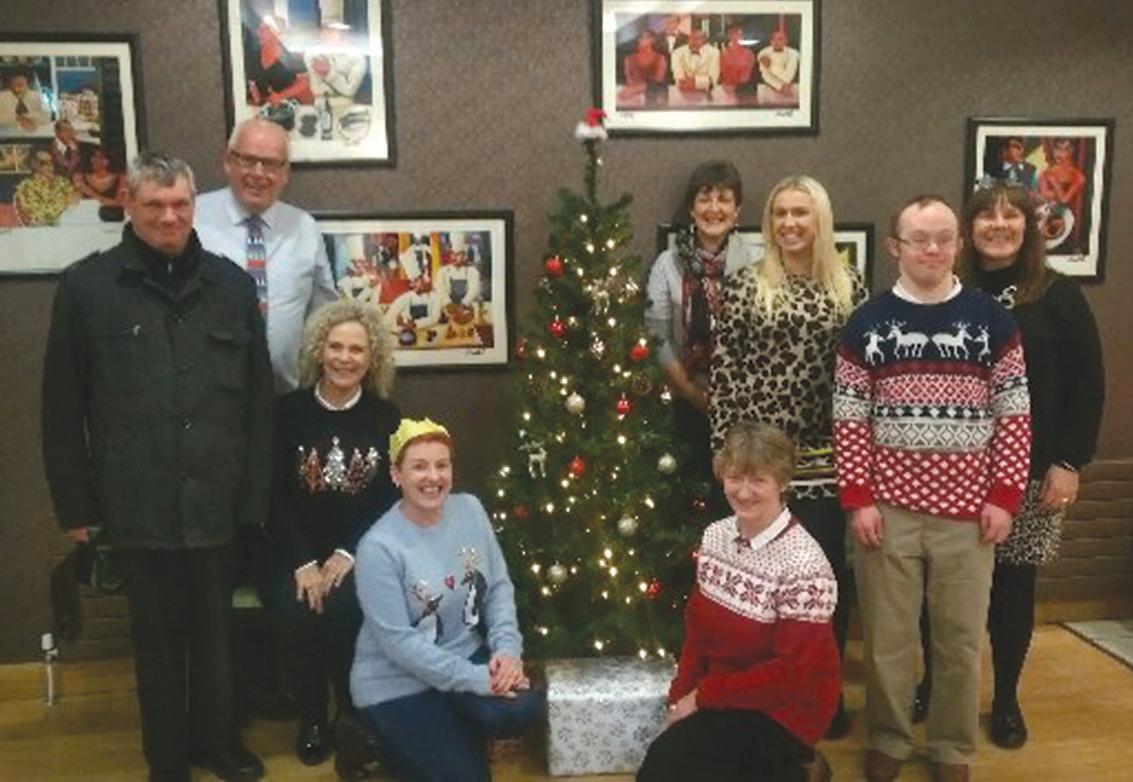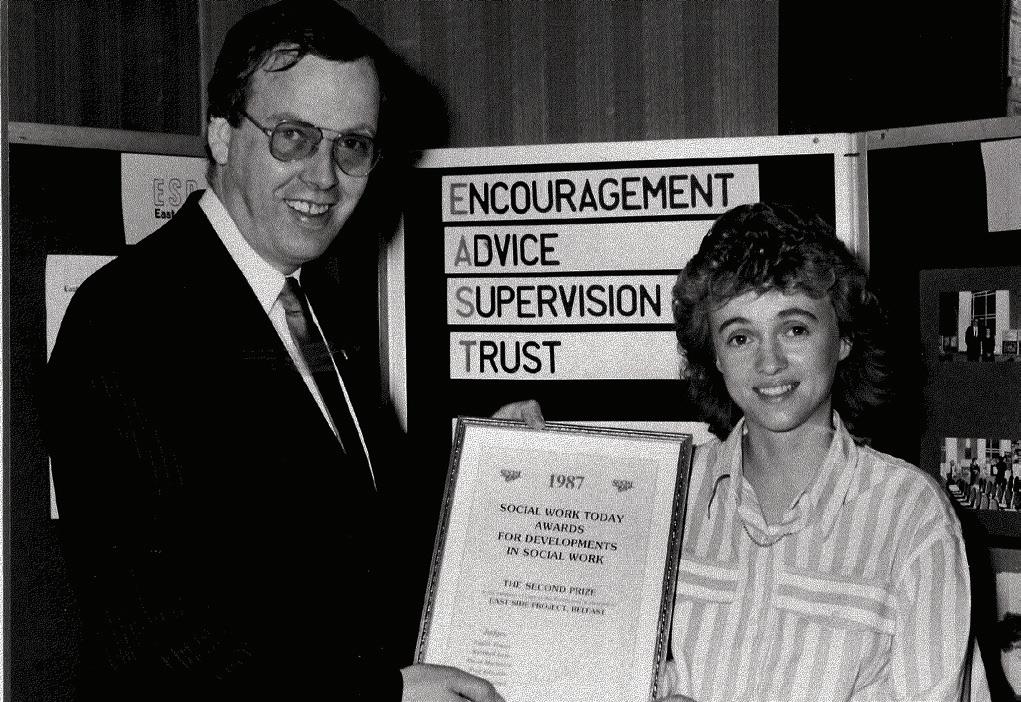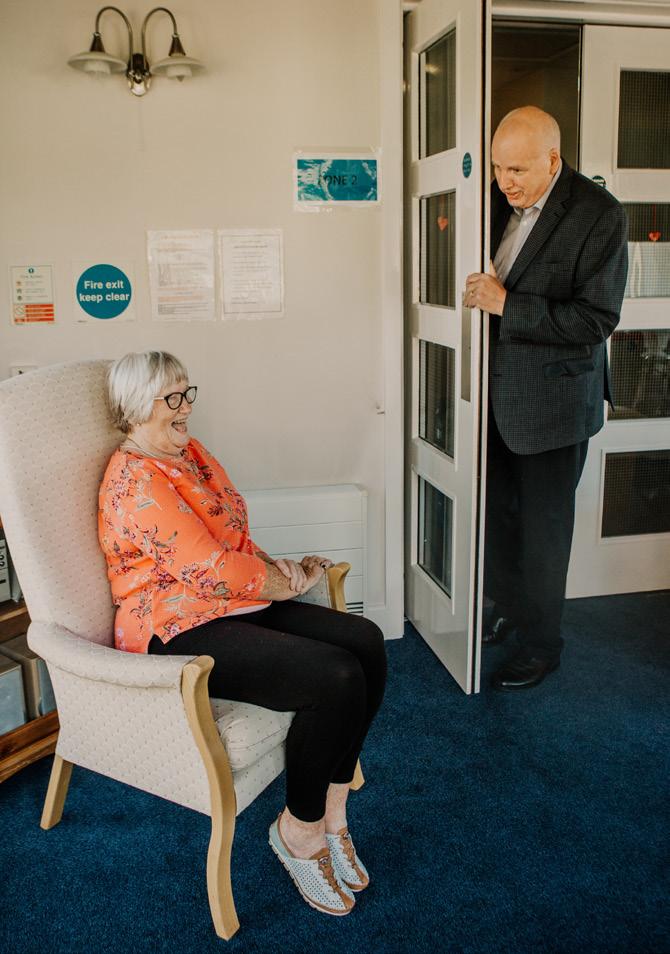
9 minute read
Big shoes to fill
Big shoes
to fill
Ruth Sanderson chats to Lindsay Conway, ahead of his retirement as Secretary of PCI’s Council for Social Witness.
Photography: Jamie Trimble
If you’ve ever met Lindsay Conway, the chances are, you won’t have forgotten him in a hurry. His imposing stature is matched with the largesse of his character and you will have either come away from a conversation with him chuckling to yourself, or mulling over some radical notion he has just proposed. Either way, an interaction with him is never dull and always thought-provoking.
Next month Lindsay retires from his role leading the Council for Social Witness. After a career spanning five decades, it’s been the last 18 months and how PCI has responded to the Covid crisis which has proven the most challenging. Yet far from being exhausted, he has been a clear and decisive leader in the most difficult of times. Now that the world is settling down, he feels it’s the right time to hand over the baton.
“I’m still getting used to the idea of retirement,” he tells me. “Thankfully there’s been a long run-in time, you only do it once so you want to enjoy it and people are being lovely. It’s certainly going to be different!”
He tells me his energies are going to be poured into a 1975 Beetle and a lathe.
I ask how his wife Norma feels about it. “The jury’s out!” he chuckles. “No, really she’s looking forward to it – we both are really.”
A son of east Belfast, Lindsay grew up in Megain Memorial Presbyterian Church on the Newtownards Road. It was a hard time, the Troubles were beginning and the area was, and still is, a flashpoint. Yet Lindsay had a passion for the area and for its people. Growing up in a Christian family, there was never a time he didn’t know the embrace of Christ in his life.
Social witness should be the oxygen of our Christian witness…faith and actions have to go hand in glove.

Presenting an award The Social Witness team

He married Norma, who he met while she was the Guide leader in Strand Presbyterian. “I ran off with the Guide captain!” he laughs. “Although, our mums do tell the story of our prams passing on the Circular Road.”
Lindsay and Norma have been married for over 40 years and have two grown up children, Fiona and Darren.
Lindsay initially wanted to be a photographer, and served an apprenticeship as an industrial photographer at Mackies. Yet he felt the call of God in his life and went to college with the intention of becoming a Presbyterian minister.
God had other plans.
“During my summers of student days I was involved in summer schemes. One day someone wanted people to lead one of the first groups abroad, with 20 Protestant and Catholic kids. I took it on and was offered a job at the end of it.
“I went on to train as a social worker, but there was always that thought that some day I would go back to ministry, but doors opened and closed over the years. One of the biggest doors which opened was that I was elected as national chairman of the YMCA at the age of 27. ‘Lord what are you doing?’ I asked.”
This proved to be a pivotal moment for Lindsay. At the time, the YMCA was involved in important cross community bridge-building. The red triangle was synonymous with peace and reconciliation in the early 80s. Around the same time, Lindsay was ordained as an elder.
I wondered what it was in the young Lindsay which marked him out as a leader?
“When you’re tall you get on in life!” he quips. “Actually, the word which has to be used is passion. Passion for people, passion for the work. And a stubbornness – you have to speak truth to power, never shrink from that. For example, through the YMCA, we had to challenge people: What are you really doing for peace? Why have our prayers for peace not been answered?”
The bulk of his social work life was spent in Rathgael Training School (later the Rathgael Centre for Children and Young People). He started there in 1972 and left in 2002 as the director of Juvenile Justice.
Since then, Lindsay has been the Secretary for the Council for Social Witness (CSW), managing and overseeing the social care arm of the Presbyterian Church in Ireland. The Council is a key element of how

Receiving his OBE Presbyterianism seeks to meet the physical needs of those marginalised by society, those who simply need help.
Through CSW the Church provides services for a diverse range of users across Ireland. This includes residential care, supported housing and nursing care for older people; day care, residential respite care, supported living and other services for people with a learning disability or a physical disability. The Church also works with people with addictions and with offenders.
During his tenure, the facilities and remit have expanded. This is important, understated, hard work. It goes on 24/7 and makes an unspeakable difference to those who use it.
“There were a number of challenges when I first arrived,” he tells me. “All the homes were free standing, so we had to bring a number of single units under a cohesive manageable unit. Then there were issues of child protection and safeguarding which had to be addressed. Taking Care 1 and 2 were the big projects in the early years.”
These challenges were not just at a PCI level, they were also on a societal level.
“I was also involved with representing PCI on a journey of healing with other denominations and also with victims. We had to look at the trauma of what had gone on here and how that had affected our clergy. Very often they were just told to ‘get on with it’ – whether it was paramilitary funerals, members of their congregations being killed or injured, or their own personal intimidation. This all had to be addressed – how could the Church best support its ministers to come to terms with what had happened and the long-term impacts of that?”
One of the long-term challenges for Lindsay has been how to fully engage the Church with social witness.



With a Sunnyside resident
“Social witness should be the oxygen of our Christian witness.” He points to the book of James as ‘the anthem for social witness’.
“You have everything in the book of James, from a strategic plan, to a business plan! If you use those guidelines then we are a Church that can make a massive difference. Embedded in that message is everything to do with actions speaking louder than words, that faith and actions have to go hand in glove.
“There is sometimes a debate that a social gospel is a diluted gospel – it’s not. I accept that different people have different gifts, but I don’t accept that it’s a dilution.”
If anything, Lindsay points to the very nature of social witness as being able to reach a whole range of people which the traditional church often doesn’t.
“Where else could I do colouring in with someone with special needs; where else could I have lunch with a drug addict or a lifer? To me, that’s what it’s all about.”
For Lindsay, the frustration is that many churches don’t even know they are involved in social witness. “I’ll ask, do you have a bowling club? A mums and tots? A youth club? That’s all social witness with evangelism!”
After a lifetime of working with some of the most challenging subject matter, it was the Covid crisis which really tested Lindsay and his team.
“I had come through my professional life to that date more or less having the answers, and for the first time in my career, I hadn’t the answers. No one had the answers, but that doesn’t make you feel any better.” The pandemic, of course, impacted hugely on the NHS, but it was care homes throughout the UK, and in fact globally, who bore the brunt of Covid’s initial devastation. The first wave of the virus adversely affected the elderly and vulnerable, and a decision was made in the early days of the pandemic that elderly patients should be moved back into care homes instead of remaining in NHS beds. This would cause Covid-19 to spread like wildfire through an elderly, vulnerable population. It also made the (often low paid) care home staff vulnerable, not just to infection, but also to the emotional trauma of having to deal with so many ill and dying residents. In this emerging context, Lindsay made the difficult decision to lock down PCI’s care homes early in March 2020. “It was the hardest letter I’ve ever had to write. I was denying families access to their mums and grannies just before Mother’s Day.” Remarkably, none of the PCI homes had a Covid outbreak for seven months. His early intervention undoubtedly saved lives. “In the end, we eventually got a lot of affirmation from families, but there were a fair amount of personal attacks at the time too, from families who felt aggrieved to be kept away from their elderly parents.” With hindsight, it was the correct decision, but Lindsay now thinks there is a long way to go to understand and deal with the impact of the past year and a half. At the opening of Corkey House With wife Norma
“How do we compensate for those who haven’t had a proper funeral? For those who weren’t able to be with a loved one when they died? Now it’s about how we respond to it all. This is our world war, this is where we tell survival stories and stories of all the personal loss. This will sound so alien when we go back to the new normal, but in saying that, the new normal will be totally different. For example, we were so relaxed about anyone walking into a hospital or visit in a care home. Those days are over.”
Lindsay’s great passion is not just for the people who benefit from social witness, but those who deliver it. During the pandemic, the focus was on preserving the health service which left the care sector vulnerable. Yet the system couldn’t have survived without it.
“I never thought I’d put social care staff at risk to take care of people, but we had to during the pandemic.
“Going forward, we need to look at the relationship between the statutory and voluntary faith sector. Some of the most effective and innovative social work is done within the voluntary sector. We need to bring home that we have a vital role to play.” Now, as he heads into retirement, Lindsay is leaving some large shoes to fill (in more ways than one!). Yet his tenure over the past 19 years will leave a legacy which will reverberate for years to come for the countless people impacted by his work, and a foundation for the gospel of social witness to flourish further.








